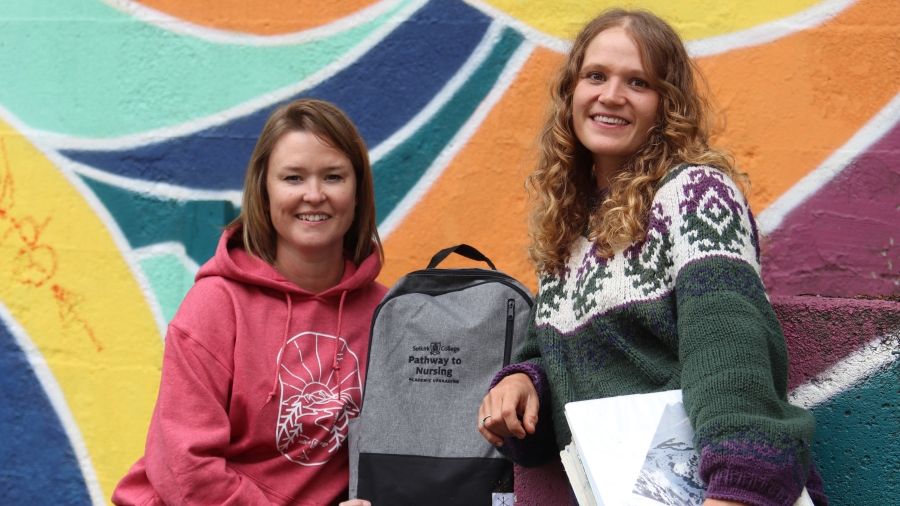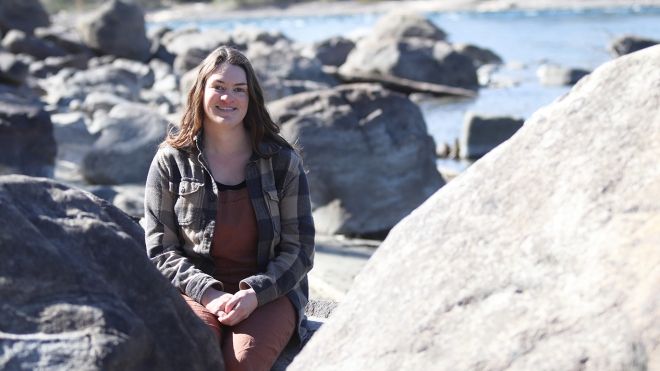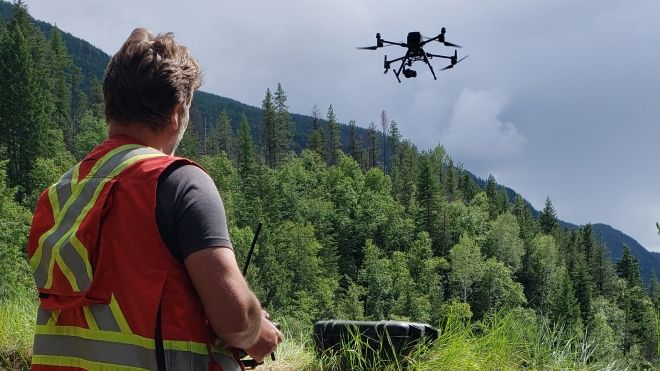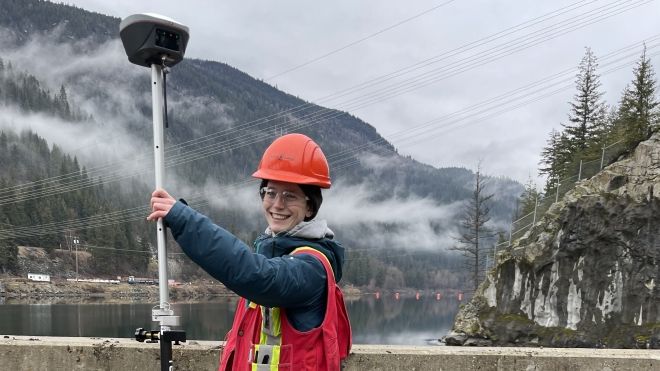Recreation, Fish and Wildlife Technology - Diploma
Overview
There is an ever-growing need for skilled technologists to play a critical role in understanding, managing and protecting our vital natural environments. Whether your interests lie in the importance of ensuring the integrity of fish and wildlife habitats or creating sustainable outdoor recreation opportunities, this program is for you.
Experience-based learning using new technology gives you the hands-on skills and knowledge necessary to successfully compete for jobs like park rangers, provincial fisheries and wildlife technologist and recreation technologist.
Practical training includes computer systems for environmental technologies, ecosystem health and management, fish and wildlife identification and management, parks and recreation management, avalanche awareness, and back-country navigation and travel. Our outdoor classroom provides relevant learning experiences for you to gain valuable skills in backcountry recreation and fish and wildlife management and get practical training in computer systems for environmental technologies, ecosystem health and management, fish and wildlife identification and management, parks and recreation management, avalanche awareness and backcountry navigation and travel.
*This program may be eligible for the post-graduation work permit (PGWP).
Accreditation
The Recreation, Fish and Wildlife Technology Program is Nationally accredited through Technology Accreditation Canada (TAC), Provincially accredited by the College of Applied Biologists and North America accredited by the North American Wildlife Technology Association.
To help ensure the program is relevant, the quality of the program has been assessed against industry outcomes. The program receives feedback from our Program Advisory Committee, which consists of industry and government representatives, including many past graduates.
Transferability
The Recreation, Fish & Wildlife Program ladders into the Bachelor's Degree in Geographic Information Systems.
There is a long-standing tradition of our graduates transferring and successfully completing university degrees. Program graduates have successfully transferred credit toward degrees in universities throughout Canada and the United States.
Selkirk College also has formal transfer agreements with:
- Thompson Rivers University, Bachelor of Natural Resource Science
- Lethbridge University, Bachelor of Applied Conservation Enforcement
- Vancouver Island University, Bachelor of Natural Resource Protection
Please note that students planning to transfer into a degree program at another post-secondary institution must check the transfer requirements of the program they wish to enrol in. It is strongly recommended that students consult with the program advisor of the receiving institution to ensure that they have all of the necessary transfer requirements.
Common Core
The first year of the Recreation, Fish & Wildlife consists of a core of environmental courses in soils, hydrology, botany, surveying, fish and wildlife, ecology, mapping, communications, computers and math. This core year is common with the Applied Environmental Science and Planning Technology (AESP) and Forest Technology programs.
The second year of each program synthesizes the skills, knowledge, and professionalism of first year with applied management, planning, and advanced techniques and principles. Integration of learning in each program is required.
The common core allows students to obtain an additional diploma in Applied Environmental Science and Planning Technology or Forest Technology by completing the relevant third year.
News
Program Outcomes
Upon successful completion of this program, learners will be able to:
1. Manage and analyze information that contributes to applied research
2. Use critical thinking skills to solve problems
3. Communicate technical information effectively in both oral and written forms to a variety of audiences
4. Demonstrate capability to use and maintain appropriate equipment
5. Identify and collaborate with appropriate stakeholders to aid with project success
6. Develop proposals, manage budgets, contracts, and financial information
7. Navigate current government structure, industry standards, and legislation, to implement best practices
8. Model professionalism by adhering to professional ethics and standards and by committing to life-long learning and a healthy work-life balance
9. Apply appropriate techniques to identify, sample, and record biological and physical components of natural systems
10. Choose and employ appropriate technology to collect, manage, explore and visualize data
11. Develop and apply risk management strategies that incorporate safe travel and best work practices, including OHS requirements to ensure personal, crew, and public safety
12. Demonstrate field experience and skill
13. Recognize the diversity of Indigenous Nations’ cultures and traditions as distinct knowledge systems that are valid and critical to building respectful engagement, consultation, and collaborative relationships
14. Acknowledge the Calls to Truth and Reconciliation and the United Nations’ Declaration on the Rights of Indigenous Peoples as inclusive and informed constructs for Indigenous rights and title in the stewardship of land, water, soil, plants, and animals
Admission Requirements
In addition to meeting the general admission requirements to Selkirk College, the applicant must meet the following Environment and Geomatics Programs requirements to be considered fully-qualified:
Successful completion of these high-school or equivalent courses:
- Foundations of Mathematics 11 with a minimum of 67% or higher
- Any BC Science Curriculum (with a lab component) at the grade 11 or 12 level with a minimum of 67%
- English Studies 12, English First Peoples 12, or ENGL 60 with a minimum of 67% or higher
NOTE: Applicants in Grade 12 at the time of application must show proof of registration or completion of the above courses.
Applicants that do not meet the above listed minimum requirements may still gain provisional acceptance for program seats if they can show proof of registration of prerequisite high school courses. These prerequisite high school courses must be completed by July 31 before Fall Term start dates.
Computer competency is an important element of success in the program. Prior to starting the program, it is strongly recommended that students have entry-level experience with word processor, spreadsheet and web-browsing software. Check out Selkirk College Community Education & Workplace Training computer courses.
General
Applicants must submit a completed application form and other required documents (i.e. secondary school and any post-secondary transcripts, application package) to the Registrar’s office.
(i) A Class 5 Driver's license is recommended but not required.
(ii) Most learning activities within the program reflect industry norms. A demonstrated interest in, and aptitude for, outdoor work is essential as much of the work is done in the field, often under adverse and arduous weather and topographic conditions. Training often occurs in wilderness back or front country terrain. Therefore, applicants should be in good health and physical condition. Activities will be taught which require student participation walking or canoeing outside for up to seven hours per day. There may be multi-day trips in backcountry locations. Students will be required to hike, ski, snowshoe, etc., for four to eight hours at a time over rough, sometimes difficult terrain in all weather conditions. Students will be required to maintain a reasonable pace and not hold the class back. Activities in which the student must participate may include but are not limited to the following: hiking and scrambling, orienteering, canoeing, cross-country and back country skiing, camping including snow camping, and operating power equipment such as chainsaws, backpack electrofishers, and all-terrain vehicles. Students will be required to observe all required and standard safety practices and procedures at all times.
APPLICATION PROCESS
The Application process is complete and admission to first year will be considered with:
1. Receipt of the "Application for Admission" form plus the required application fee, and;
2. Receipt of official high school and post-secondary education transcript(s) or interim transcript or proof of registration in prerequisite courses (if in Grade 12), and;
3. The date when an applicant's file is complete is the date when all the requirements of a) and b) above have been fulfilled.
CHANGE OF PROGRAM
There is some limited availability for students to change programs in the first year however, the following conditions must be met:
1. Students who want to change programs must apply in writing to the School Chair before January 15th during the first year of their original program.
2. Program changes will only be permitted provided there is space as determined by the School Chair.
3. Students may need to complete prerequisite courses prior to the beginning of the second year.
PROMOTION
1. Promotion to Subsequent Semester
Each semester must be completed with a Grade Point Average of 2.00 or better with no more than two grades below a 60% to continue into the next semester. GPA will be based on all grades for courses scheduled for a given year and semester as per the course calendar.
2. Admission Requirements - Second Year
All first-year courses must be completed with a grade of 60% or better before a student is admitted to the second year of their program. Students in this situation should contact the School Chair.
3. Prerequisite Courses
Students receiving a final grade of lower than a 60% in a prerequisite course will not be able to register in the subsequent course requiring the prerequisite. Students in this situation must re- register in, and successfully complete the course with a minimum grade of 60% before going on to the subsequent course.
GRADUATION
Credentials:
i. A cumulative GPA of 2.0 and a minimum grade of 60% in all courses in the program is required for graduation.
ii. A student will be expected to complete the requirements for a diploma within a maximum of four years from the initial admission.
iii. No diploma will be awarded without meeting all obligations to the College. This includes returning all equipment signed out and paying all outstanding fees.
b. Types of Credential Received
Diploma – Recreation, Fish and Wildlife Technology
c. Requirements: (see Policy 8617: Graduation)
Certificates: All students strongly recommended to have a valid WorkSafe BC approved first aid certificate at the time of graduation. These courses are offered throughout the year through Selkirk College Community Education & Workplace Training.
CO-OP EDUCATION
This program is eligible for co-op education opportunities. Co-op education courses will provide students with documented, program relevant work experience that is recognized with a designation on their transcript.
Please refer to Policy 8370 Selkirk College Co-operative Education and Selkirk College Co-operative Education Procedures for additional information regarding Co-op Education at Selkirk College.
Courses
ENVR150 - Hydrology I
ENVR 150 Hydrology I is an introductory study of water in our environment including its properties, the natural processes which affect it, and climate and weather. Students will gain practical experience in the collection and analysis of field and laboratory data using standard techniques and equipment.
ENVR160 - Surveying and Field Measurements
ENVR 160 Surveying and Field Measurements is an introduction to the practical use of common survey instruments and techniques used by Environmental technicians. As well, the course will introduce the student to various sampling methods used to collect, assess, classify, and evaluate field data. Emphasis is placed on the proper care and use of basic surveying and measurement tools and the skills involved in collecting and interpreting precise and accurate field data.
ENVR162 - Applied Botany and Ecosystem Classification
ENVR 162 Applied Botany and Ecosystem Classification is an introduction to the principles of Botany and Ecosystem Classification. Botany lectures will focus on plant classification, botanical terms, plant morphology, and plant physiology. Topics include: plant cell structure, plant tissue function and structure, photosynthesis and respiration, transpiration and translocation. Botany labs will focus on learning to identify about 100 native plants commonly found in the West Kootenay Region of B.C., specifically key indicator species. Ecology lectures will focus on ecosystem classification using the Biogeoclimatic Ecosystem Classification System (BEC) of B.C. Other key topics include the study of climatic factors, disturbance and succession, landscapes and stand structure. Ecology labs focus on classifying ecosystems (including soils, site and vegetation) to site series using BEC. Labs are mainly field based.
ENVR164 - Soil and Earth Sciences
ENVR 164 Soil and Earth Sciences will cover the identification of common rocks and minerals, landforms and soils of British Columbia. Learners will be introduced to the study of physical geology and geomorphology in relation to management of the forest environment and landscape. Learners will gain skills and knowledge in rock and mineral identification, description of the physical and chemical qualities of soils, and identification and classification of landforms and terrain. Skills will also be developed with respect to interpretation of geology, landforms and soils for environmental management.
ENVR190 - Computer Applications in Natural Resource Management
ENVR 190 Computer Applications in Natural Resource Management. This introductory course builds on students' basic computer skills, focusing on applications relevant to careers in the environment and geomatics sectors. Students will learn to organize and manage files, create presentations and graphics, and develop spreadsheet skills. The course also covers formatting professional documents, setting up data collection on tablets, and transferring data between systems. Emphasis is placed on applying these skills to real-world tasks and demonstrating professionalism in digital work.
MATH160 - Technical Math Review
MATH 160 Technical Math Review is a mathematical review course for first-year students in the School of Environment and Geomatics (SEG) diploma programs. This course will provide a review of mathematical concepts which you will need for your other SEG courses. Materials to be covered include: unit conversions, trigonometry, exponentials and logarithms, problem solving, slope calculations, distance and direction calculations.
TWC150 - Introduction to Technical Writing and Communications I
TWC 150 Introduction to Technical Writing and Communications I is an introduction to general principles in written technical communication and their application to environmental concerns and workplace communication. Classroom sessions focus on developing writing skills, the organization and presentation of data, basic report formats, and job search techniques.
ENVR154 - Maps and Navigation
ENVR 154 Maps and Navigation focuses on the navigation skills required of technologists working outdoors to locate oneself, stay ''found'', and return safely from the field. The course includes hands-on use of navigation tools in field settings including map, compass, aerial imagery, altimeter, and Global Positioning System (GPS). Pre-trip planning in a navigation context will also be covered including developing access plans and route plans, and estimating travel times.
ENVR158 - Introduction to Geomatics
ENVR 158 Introduction to Geomatics is an introduction to applied mapping and geographic information systems (GIS) theory and applications. The first half of the course will be focused on introducing basic uses of remotely sensed imagery and exploring applied mapping technologies, including Google Earth and Internet Mapping websites. The second half of the semester will be focused on learning basic Geographic Information System concepts and applying GIS technologies to environmental, renewable resource management, and planning fields. Emphasis will be placed on how geographic data is represented, collected, managed, analyzed, and displayed using GIS tools. Hands-on experience will be developed with desktop GIS software, ESRI's ArcGIS for Desktop.
ENVR163 - Terrestrial Ecology and Biology
ENVR 163 Terrestrial Ecology and Biology builds upon the concepts from ENVR 162 with further studies of local forest ecosystems. Students will identify key forest structural components and study the role that disturbance (such as fire), environmental gradients, and competition play in defining a species' niche. Participants will also examine the role of primary and secondary growth, nutrient uptake, reproduction, and survival mechanisms for plants. Winter plant identification, ecosystem form and function, and plant adaptations to timberline will also be examined. A practical field based assignment will form a major portion of the term assessment. This project includes collecting the data in the field, entering and analyzing the data in the computer lab, and presenting the data in a written scientific report.
ENVR170 - Fish and Wildlife Ecology
ENVR 170 Fish and Wildlife Ecology is designed to introduce students to the general ecological principles, taxonomy and management of fish and wildlife in British Columbia.
MATH190 - Resource Statistics I
MATH 190 Resource Statistics I is an introductory applied statistics course for environment and geomatics students. Topics include: types of data, descriptive statistics, probability and random variables, discrete probability distributions, continuous probability distributions, confidence intervals, sample size, and hypothesis testing.
TWC151 - Introduction to Technical Writing and Communications II
TWC 151 Introduction to Technical Writing and Communications II is an introduction to general principles in written scientific communication, research strategies, and oral presentations. Lectures and in-class writing focus upon research strategies, the formal report, technical style, and graphic illustration. Students practice delivery techniques for oral presentations and learn research skills for research report preparation.
RFW255 - Spring Field School
RFW 255 RFW Field School is a two-week course in the spring where students learn and apply field-related skills directly in activities related to the recreation, fish and wildlife professional areas. Activities include canoeing, navigation, fish habitat surveys, habitat enhancement, wildlife survey, ATV safety, and trail work. Students who successfully complete the canoeing section will receive certification. Students who successfully complete the optional electrofishing section will also receive certification. The intention is to cover skills and learning objectives that do not fit well into a regular semester schedule. In addition, many of the activities are intended to prepare students for RFW 200 - Fall Field Study, and for summer employment.
RFW200 - Field Trip Study
RFW 200 Field Trip Study is a course in which second year Recreation, Fish and Wildlife students participate in field-based learning. This extended field trip provides students with opportunities to refine technical field skills in settings that mimic the workplace. Students will be involved in the planning and preparation for this trip and will be provided with opportunities to develop team skills, leadership and professionalism throughout the course.
RFW256 - Backcountry Risk Analysis and Mitigation I
RFW 256 Backcountry Risk Analysis and Mitigation I is a course where students integrate the knowledge and skills acquired in other program courses to identify, analyze, and manage areas of public and occupational risk within backcountry workplaces. Human, terrestrial, aquatic, and environmental hazards and risk are explored including an examination of leadership and decision-making skills, natural hazard analysis, land-use planning, risk management and mitigation, advanced navigation techniques, backcountry rescue, meteorology, and field weather forecasting.
RFW262 - Ecosystem-Based Management
RFW 262 The course Ecosystem-Based Management provides learning opportunities for students in ecosystem-based management. In the course the student will continue to learn about ecosystem structure and function at the stand and landscape scale, forest ecosystem health including identification and biology of prominent forest insects and diseases, invasive species, wetland and riparian conservation and management, and ecosystem restoration activities. The course will place an emphasis on observation using standard data collection and analysis. These will be used to prepare prescriptions that implement an ecological approach to land management. The student will gain employable skills related to forest health identification, ecosystem interpretation, ecosystem restoration, and adaptive management.
RFW263 - Outdoor Recreation Operations and Management
RFW 263 Outdoor Recreation Operations and Management is designed to prepare the student for employment in the field of parks and outdoor recreation. The variety of employers offering outdoor recreation opportunities in B.C., and their roles in the province are examined. Practical field skills such as trail and campground design, construction, and maintenance as well as analytical skills such as monitoring and managing impacts, assessing public safety, developing site plans and incorporating multiple natural resource and social values in protected area management will be studied and practiced. Examples of real, contemporary recreational management issues are used to make the course current and relevant.
RFW272 - Techniques in Wildlife Sciences I
RFW 272 Techniques in Wildlife Sciences I covers the ecology and management of bears, medium-sized carnivores and raptors in British Columbia. There is emphasis on applying wildlife sampling techniques and assessing and managing for species of concern.
RFW280 - Techniques in Aquatics and Fisheries I
RFW 280 Techniques in Aquatics and Fisheries I covers the biology, ecology and management of freshwater fish and aquatic ecosystems, including standard field, laboratory, and office techniques used to sample these ecosystems. The emphasis is on assessing and managing freshwater ecosystems in B.C. Fish taxonomy, physiology, reproduction and habitat requirements are included, with an emphasis on practical considerations for field sampling and management. The material in this course is continued in RFW 281.
ENVR290 - GIS Applications in Natural Resource Management
ENVR 290 GIS Applications in Natural Resource Management continues to introduce Geographic Information Systems (GIS) through the use of ArcGIS Pro and other related software and apps. One focus will be common GIS data management, exploration and analysis tasks, and preparing basic cartographic maps. This will include integrated projects aligned with other Recreation, Fish and Wildlife classes. Another focus will be setting up for efficient mobile data collection, and importing mobile data into various applications.
ENVR250 - Indigenous Rights and Environmental Management
ENVR 250 Indigenous Rights and Environmental Management is an introduction to Indigenous cultures and traditional practices as foundational teachings of sustainability. The overarching focus of the course is recognizing and acknowledging Indigenous rights and traditional knowledge as they relate to environmental management.
With a two-eyed seeing approach, topics associated with environmental management will be viewed through the lens of Indigenous Rights and Truth and Reconciliation. The four main overlapping themes of the course are Indigenous cultures & practices, legislation, treaties, and Indigenous vs. Western approaches to environmental management and protection.
RFW251 - Environmental Legislation and Policy
RFW 251 Environment Legislation and Policy provides an introduction to foundational principles related to Canada's legal system, while covering the study of statutes, regulations, court cases and policy governing recreation and the environment, with reference to legal issues involving indigenous peoples where applicable. Emphasis is placed on interpreting and applying environmental, conservation and natural resource legislation, and its intersection with related policy, while developing practical legal research, writing and problem-solving skills.
RFW257 - Backcountry Risk Analysis and Mitigation II
RFW 257 Backcountry Risk Analysis and Mitigation II extends the study of natural hazard assessment and land management to winter backcountry environments. The course is delivered as a project-based analysis of a local provincial park or recreation area, in which students learn winter skills and identify and analyze avalanche terrain and site-specific snowpack characteristics for the risk of human and structural exposure to snow avalanches. Topics include avalanche forecasting and public safety, land use planning, hazard mitigation, techniques in snowpack assessment and monitoring, avalanche rescue, and hazard mapping. Successful students receive a certificate in avalanche safety recognized by Avalanche Canada.
This course is taught in wilderness terrain. Participants must be in good health and physical condition. Activities will be taught that require participation for up to eight hours per day for up to three days in duration. Participants must be able to hike, ski or snowshoe for four to eight hours at a time over rough, sometimes hazardous terrain in all weather conditions.
*Students are expected to make arrangements to attend all scheduled course activities.
RFW265 - Commercial Recreation Management
RFW 265 In Commercial Recreation Management students gain an understanding and awareness of the elements of commercial recreation operations from the proposal stage to the delivery stage including the nature and demand for outdoor commercial recreation activities and their potential environmental impacts. Particular attention is paid to the current policies, regulations and legislation governing commercial recreation in the province. Because contracts are an integral part of commercial recreation, the skills and knowledge related to contract management and developing and evaluating contract proposals will be developed in the second half of the course.
RFW271 - Applied Research Project
RFW 271 Applied Research Project is an introduction to the basic principles and methods of research with an emphasis on natural resource and ecosystem management. The objective of this course is to assist each student in completing an applied research project that has both a field-based data collection component and a literature-based research component. With assistance from a Faculty Advisor, students will select an approved research topic and complete a number of assignments including writing a research proposal and developing a final report. The research results and recommendations will be presented at the SEG student conference. This course spans the fall and winter semesters.
RFW273 - Techniques in Wildlife Sciences II
RFW 273 Techniques in Wildlife Sciences II covers the ecology and management of sheep and goats, waterfowl, bats and songbirds in British Columbia. It introduces the student to sampling design, human-wildlife conflict and wildlife diseases. There is continued emphasis on applying wildlife sampling techniques and ecology to assessing, managing and conserving wildlife species of concern.
RFW281 - Techniques in Aquatics and Fisheries II
RFW 281 Techniques in Aquatics and Fisheries II covers the ecology and management of freshwater fish and aquatic ecosystems, including standard field, laboratory, and office techniques used to sample in these ecosystems. The emphasis is on evaluating, assessing and managing freshwater ecosystems in B.C. This material in this course is a continuation of the material in RFW 280.
Tuition & Fees
All amounts are estimates and are subject to change. Tuition amounts are based on a full-time course load. Please note that many programs have additional costs beyond those listed here. For more information, please visit Tuition & Fees.
Find Out More
We look forward to connecting with you! Fill out this form and we'll reach out to you.






